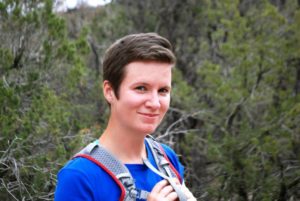Addy Brown’s challenges with her own mental health have guided her research, fieldwork, and volunteer experiences as a student in the Department of Occupational Therapy.
Brown grew up in Tennessee but says Oregon has always felt more like home. She lived in Portland for eight years, where she met her wife, Shannon Ross. She came to Colorado State University because of the department’s No. 6 national ranking by U.S. News and World Report and because she was interested in research opportunities. She and her wife also love the outdoors, making Colorado a natural fit.
 While at CSU, Brown says she has been vigilant about self-care and managing her mental illness. But she also sees a positive side for her chosen profession as an occupational therapist. “In some ways, I feel like having a mental illness has been a tremendous asset for me professionally. My first fieldwork was at the Colorado Mental Health Institute in Pueblo, which is the state forensic mental health facility. As someone with lived experience with mental illness, it was easy for me to relate to clients and empathize with their struggles,” she said.
While at CSU, Brown says she has been vigilant about self-care and managing her mental illness. But she also sees a positive side for her chosen profession as an occupational therapist. “In some ways, I feel like having a mental illness has been a tremendous asset for me professionally. My first fieldwork was at the Colorado Mental Health Institute in Pueblo, which is the state forensic mental health facility. As someone with lived experience with mental illness, it was easy for me to relate to clients and empathize with their struggles,” she said.
Brown took a particular interest in research while at CSU. She was part of a three-person research team with OT students Devin Barth and Amanda Zorn headed by Barb Hooper. “My theory building study was on the utility of the Subject-Centered Integrative Learning model for occupational therapy, which Dr. Hooper has been developing over several years. With Dr. Hooper, I interviewed faculty members from across the country about their experiences using the model and analyzed the efficacy of the model in their teaching. It was immensely rewarding to work with someone as accomplished as Dr. Hooper.”
Brown presented her research with colleagues at the Occupational Therapy Association of Colorado annual conference, and she will be presenting a poster at the American Occupational Therapy Association national conference.
Brown also was involved in the Student Occupational Therapy Association on the Professional Development Committee. She arranged for several mental health OTs from Colorado to participate in a panel on Mental Health and OT, which was well-attended by the OT students.
Brown gives lots of credit for her success to CSU faculty and staff, especially Hooper, who was her thesis adviser and who helped her grow personally and professionally. “Dr. Hooper is quite brilliant. She taught me that ‘research is never finished, it just ends it interesting places,’” she said.
“Debi Krogh-Michna is the fieldwork administrative assistant who has been a shoulder to cry on, friend, and source of wisdom. Cathy Schelly is my supervisor for the CSU OT pilot program, and she taught me a lot about how to realize my professional aspirations and to learn to be comfortable as possible with unknowns during program development. I could go on – the faculty and staff of the CSU OT program have been tremendous,” she said.
As part of her CSU coursework, she took a program development class with Schelly. They did a needs assessment for the CSU Health Network to see if there were student needs that could be addressed through occupational therapy. This year-long project culminated in a pilot occupational therapy program with the Health Network.
“Now, I work with counseling staff, psychiatry, and medical staff to help students manage their anxiety, improve sleep, improve study skills, manage their chronic pain, and explore gender expression, among other things. I love my job and it is exciting to be able to use the skills acquired in my OT program to benefit others,” she said.
After graduation, Brown has an interest in working in the mental health field either in an inpatient or community setting, although she hasn’t decided on exactly what she wants to do. She is also interested in continuing a research career. “The benefit of occupational therapy is that we have excellent job prospects, but it does make narrowing things down a little difficult,” she said.
Brown’s openness and positive attitude are inspiring for others. “In my current job with CSU college students, my experience with mental health challenges in a university environment has helped me develop practical strategies that I pass on to my students,” she said. “I’m not embarrassed to have a mental illness; it just feels like a fundamental part of my experience with benefits and challenges that have played a part in how I have developed as a person.”